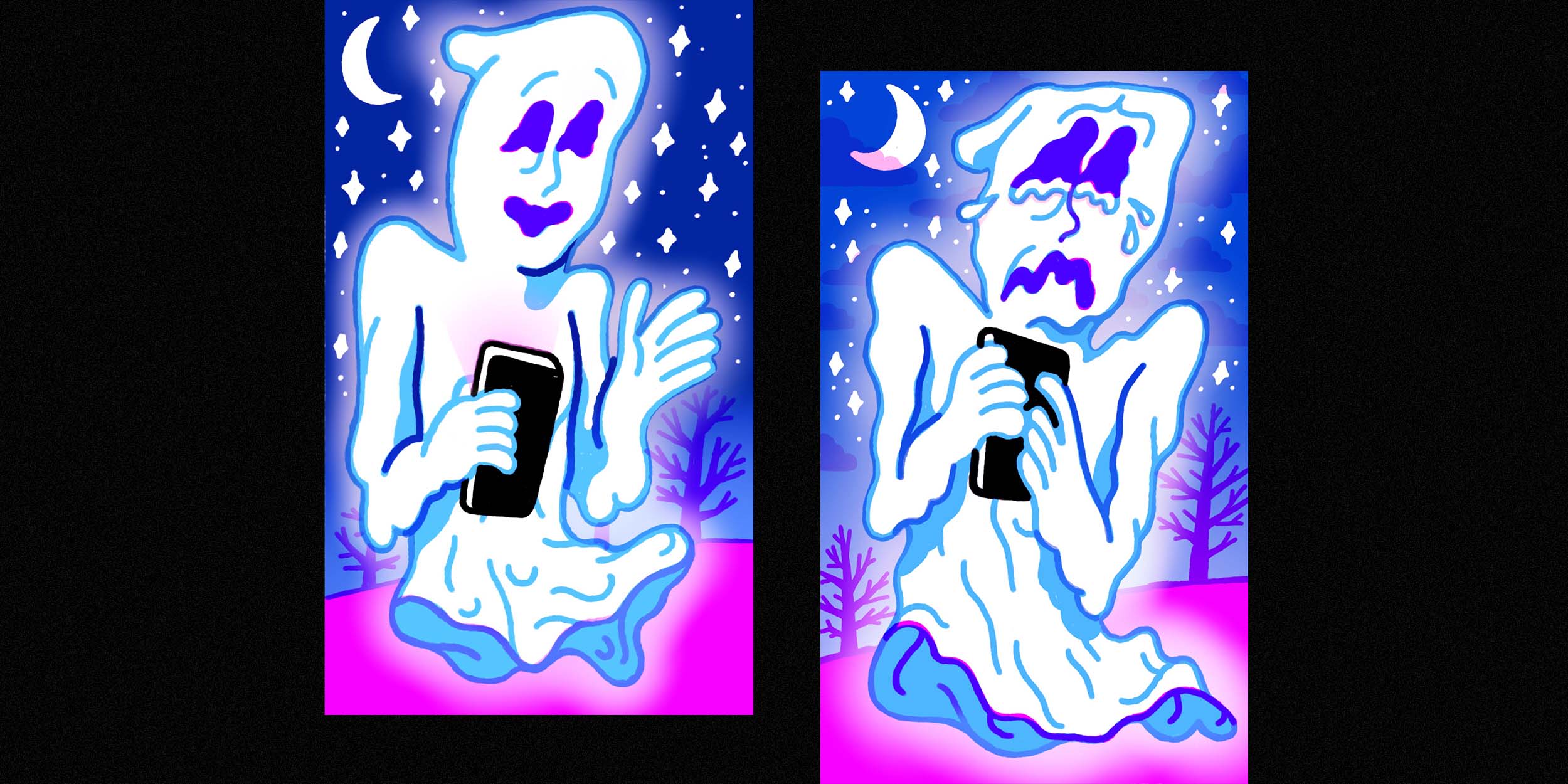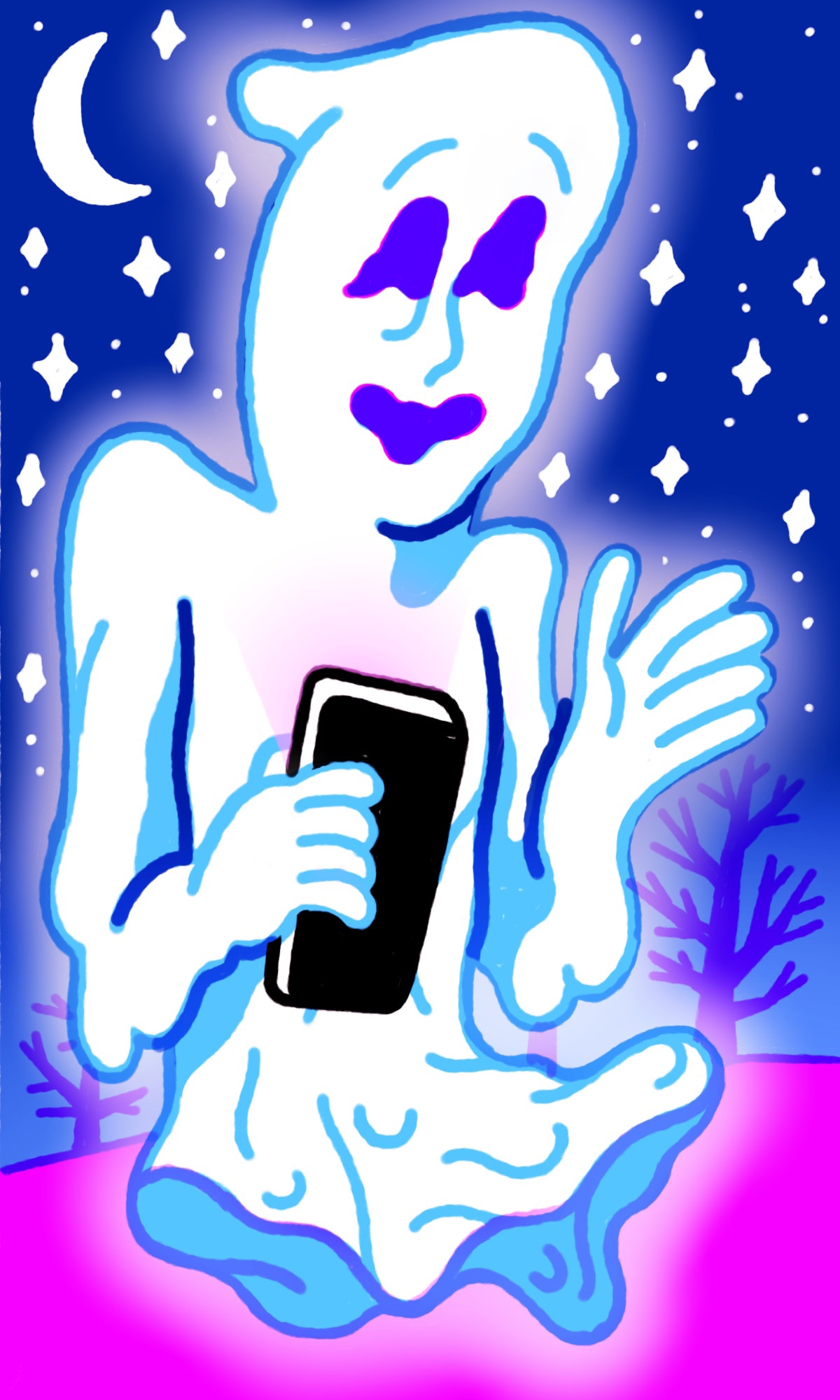
On Halloween, or any other day, is ghosting someone ever okay?
A writer who thinks ghosting is kind and a writer who thinks it’s ghoulish make their cases.
Oct. 29, 2021
Click on one to read
Ghosting someone is actually an act of kindness
By Anna Lokey
Picture this: You’ve been seeing someone for a hot second. You hung out a couple times (three if you count the time you accidentally FaceTimed them while you were going to the bathroom, and they stayed on the line until you were completely finished just to let you know that they, in fact, were listening the whole time).
This accidental intimacy aside, you would like to end things. Maybe there’s a particular reason. They chew with their mouth open. Or maybe you’re just getting the vibe that this whole thing isn’t going to work out...and that’s OK, too!
Either way you are confronted with a choice: to ghost...or attempt to articulate the reasons why you think your lives would be better separate than together.
But before your fingers get ahead of you and start sprinting down the five paragraph persuasive essay style that you haven’t revisited since middle school (latent with ethos, pathos and logos, of course), let me present the case in defense of ghosting.
Choosing not to respond to a text sends a definitive message, one that is clearer than any other text message about your feelings could ever be.
“I was going to call them, or ask to meet for a quick coffee!” you might retort if you are anti-ghosting. And my question to you is: “Why? Do you enjoy pain? Are you drowning in free time? Do you hate yourself and them by thinking the easiest course of action is truly sitting down and working through every reason why you don’t like each other?”
To be quite honest, ghosting’s biggest positive is the sheer lack of effort necessary to successfully pull it off. It’s simpler than you think: just go to the message thread and delete the entire thing. One little swipe and you’re free! Free like your schedule will be from the time you saved not having to tearfully discourse your situationship into the ground.
Rejection is a dish best served silently.
Now, to be clear, I’m only pro-ghosting if you’re in the delicate stages of dating, which is when we usually hear about ghosting. If you are married, in an uber-long relationship, or have kids with someone — these rules don’t apply. This is only for people in the, you know, defining-the-relationship phase.
Yes, I know what you’re thinking. Isn’t ghosting mean, cruel and inconsiderate of the depth of human emotion?
No. And let me tell you why.
As humans, we possess many skills of articulation, but comically, we lack the ability to fully understand the feelings of others. We view the world from our own perspective. This leads to the break-up conversation turning into painful, torturous circles where the same question of “what are we?” becomes repeated so many times it loses meaning. When it comes to matters of the heart: the more complicated the verbage, the more room for discussion, the more room for emotional torture.
Ghosting is the most morally and ethically wise solution. For both parties involved!
And I understand. Nobody wants to be left on read — not responded to even though the person saw your message. If you’re not the one doing the ghosting, the act can be a blow to our ego, knock the wind from our sails, make you look in the mirror and scream “You fool! You miserable fool!” But after the immediate sting subsides, you’ll find you no longer care... because you forgot! Try to say that about the last 7 hour dialectic you had with your FWB (friend with benefits) about why “this just wasn’t working out for you anymore.”
Joking aside, why do we act like ghosting is such a foreign concept when we engage in the behavior constantly? I know plenty of people who are straight up ghosting their student loan payments. Don’t even get me started about health care bills. And what about taxes?! Local elections?!? That Instagram DM from the girl you went to high school with who wants to sell you essential oils??!?
We all know how to ghost effectively.
One could almost say ghosting is fundamental to human nature: embedded in our instincts deep in our DNA, right next to involuntary breathing while we sleep. When we learned about cavemen choosing flight over fight when confronted with a monstrous beast, we didn’t shame them for being emotionally immature and cowardly. No! We said, “Good for you, making an educated decision and weighing the risks!”
I am not saying that communication and honesty aren’t the hallmarks of a successful and worthwhile relationship. In fact, I am wholeheartedly reaffirming that.
You deserve someone who gives you the time of day, and it is easiest to assess who that is — and isn’t — when those who aren’t intending to commit simply exit stage left. Consider it not a ghosting, but instead a disgruntled actor embracing their artistic license.
Anna Lokey is a middle-school science teacher and writer living in Brooklyn. Her work has appeared in The Washington Post and The Hill.
Being ghosted drove me crazy until I realized I wasn't the one with the problem
By Amy Klein
Dean and I had been dating for about five weeks when I met his mother. She was visiting California for Christmas, so we all had dinner together. I thought it went well, as far as mothers go.
But I didn’t hear from him that week. Give him time to recover from his mother, I told myself. Nothing the next week either. Did I offend his mother? Did I offend Dean? What could have happened?
I never did find out, because Dean had “ghosted” me.
This was at the turn of the new millennium, before this heinous action had a name. The term seems to have originated in the early 2010s, and by 2017 the definition had made it into the Merriam-Webster dictionary. By that time I was already married, having dodged the bullets of more recent dating phone apps like Tinder and Hinge and OKCupid, which are so impersonal they make it easy to ghost. Back then I was on websites like Jdate and eHarmony, which required essays as part of a person’s profile so it made you feel like you actually knew them. (Nowadays, who in their right mind would actually read and write??)
Because I didn’t know that ghosting was an official thing that heaps of people would experience in the not-too-distant future, it made me feel absolutely crazy to have never heard again from Dean. I couldn’t help but go over all of our interactions with a fine-toothed comb, wondering why, oh, why he just stopped talking to me after introducing me to his mother without a wisp of a call or at least a text. (And to think Carrie Bradshaw complained in “Sex and The City” about a Post-it note break-up from love interest Berger in 2003: “I’m Sorry, I Can’t. Don’t Hate Me.”)
“Because anxiety is a psychosocial process that includes fantasy or imagining things, when you are ghosted, you are left to imagine why you are not getting a reply, and are much more likely to imagine negative things about yourself,” says Yariv Hofstein, a clinical psychologist in private practice in New York, where I live. “When someone doesn’t reply to us, i.e. ghosting, we are much more likely to think, ‘He doesn’t like me,’ or ‘She doesn’t want to talk to me,’ as opposed to ‘He is very busy’ or ‘She doesn’t like texting.’”
I hate that in the years since I got married, ghosting — and “cloaking” (that’s ghosting someone and standing them up at the same time, then blocking them on the dating apps you originally matched on) — has become totally normal. It’s even becoming standard outside romantic relationships, with pandemic job hires ghosting employers.
It seems like the more ways we have to be in touch — text, messenger, Snapchat, Facetime, Zoom — the more people feel the need to avoid you.
As someone who grew up in a family where one parent used to go stone cold and stop talking when they were angry, ghosting really sets me off.
“People who were subjected to silent treatment growing up are much more vulnerable to experience intense anxiety to long delays in reply because that brings up fears about the person abandoning them and not coming back,” Hofstein noted.
I wish that people who ghost, take friendship breaks or otherwise go incommunicado would understand how painful it is for people like me. I live with a low thrum of suspicion that everyone I haven’t heard from in a while might be mad at me for something; but I also know that that’s a crazy voice in my head that’s probably not to be believed. Still, I guess that’s partly why I married someone who never stops speaking to me (not always a plus during pandemic lockdowns!).
During the Dean debacle, I thought it was a California thing — a conflict-avoidance tactic for nonconfrontational, non-New York guys. Right after that, I used to joke that if a guy could ditch me after I met his mother, I had better get married so that my spouse would have to serve me with divorce papers to call it quits.
Years later, I realized that it didn’t matter what Dean thought of me. The minute he didn’t have the decency to tell me he was breaking up with me was the moment it was clear he was not for me. And I try to remember that if someone has a problem with me, they have to tell me — or it’s their problem.
Now my task is to teach my daughter the same. This morning, after yelling at my first grader for not getting ready after the gazillionth time I asked her to, I pulled her in for a hug. And then I looked in her eyes and said, “I don’t want you to be in school all day thinking I’m mad at you.”
Amy Klein is the author of “The Trying Game: Get Through Fertility Treatment and Get Pregnant Without Losing Your Mind.” She is the ambassador for reConceiving Infertility, Hadassah’s initiative to combat stigma against infertility and advocate for change.
This is a recurring series from @NBCNewsThink.
Illustrator:
Vinnie Neuberg for NBC News
Design and development:
Jiachuan Wu and Robin Muccari
Art director:
Chelsea Stahl


